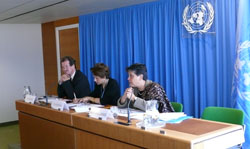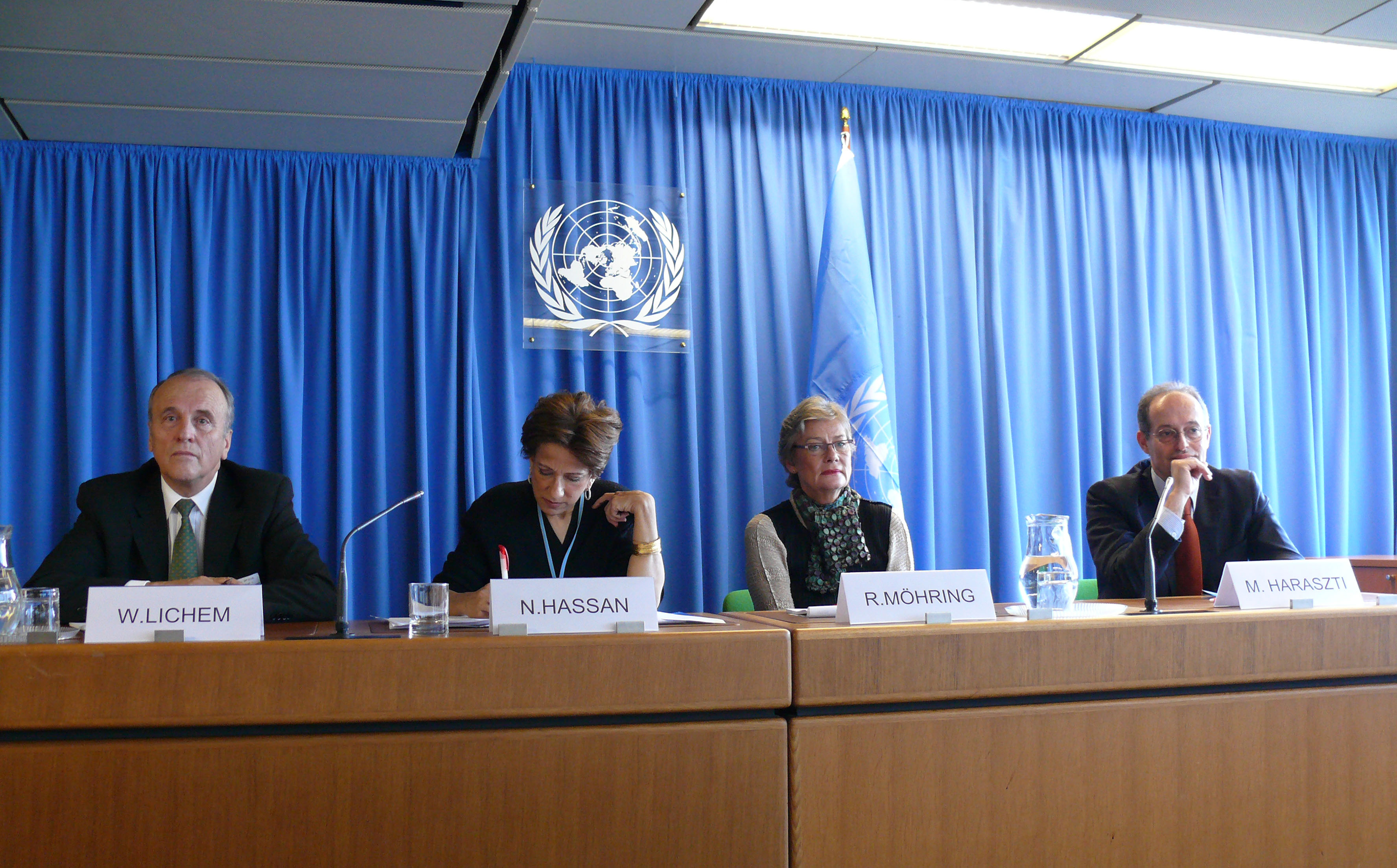More than 50 journalists, journalism students, representatives of civil society/NGOs and Permanent Missions (including ambassadors) attended the UNIS Vienna Journalist Forum on Human Rights held at the Vienna International Centre on Tuesday 7 November.
The keynote speaker was the United Nations Deputy High Commissioner for Human Rights Mehr Khan Williams who spoke on the UN role in protecting human rights; that the promotion and protection of human rights has been a central tenet of the UN since its inception and the promotion and protection of human rights pervaded the entire work of the UN; the work had moved from setting norms and standards to investigating violations through the role of the independent experts and taking action on the implementation of human rights activities. Ms. Khan Williams raised two key issues: one was the agreement at the World Summit in 2005 on the 'responsibility to protect'. "This is a major new development for Member States," she commented, "I have never seen such language come out of the General Assembly before." Now Member States have a responsibility to protect their own citizens and when they fail to do so, the international community has a responsibility to take action. The second was the need to respect all human rights as interdependent and indivisible and not to see economic, social and cultural rights as somehow second-class rights as compared to civil and political rights.
 The Special Rapporteur on Torture Manfred Nowak emphasized the importance of the highly fruitful cooperation between the United Nations, governments, NGOs, and independent experts such as himself in protecting human rights. The position of Special Rapporteur on Torture was established in 1985; he explained that as Special Rapporteur on Torture, he had two main measures available to him: firstly, in particularly urgent cases, he could make a direct urgent appeal to the authorities of the country in question, asking the country to carry out a thorough investigation and provide him with a report. Unfortunately, a number of governments did not respond adequately to these urgent appeals. A more powerful tool was probably the fact-finding mission which could only be carried out at the invitation of the government concerned. On such visits Mr. Nowak said it was essential for him to have access to detainees and the ability to speak to them in private without anyone else present. However, as an independent expert he had no power and it was up to the governments to take action. Mr. Nowak drew attention to the fact that not only governments but also the international community as a whole, including multinational corporations, had to be held accountable. Mr. Nowak noted that in many countries, torture was practised by law enforcement officials or the military even when the government was trying to eradicate the practice. He was always shocked at the lack of awareness among some government officials, police and military, about how serious a violation of human rights torture was. Commenting on the trial of Saddam Hussein in Iraq, Mr. Nowak said he strongly opposed the way the trials were conducted and that even Saddam Hussein should not be sentenced to death. Mr. Nowak also skillfully brought in the connection of human rights to MDGs.
The Special Rapporteur on Torture Manfred Nowak emphasized the importance of the highly fruitful cooperation between the United Nations, governments, NGOs, and independent experts such as himself in protecting human rights. The position of Special Rapporteur on Torture was established in 1985; he explained that as Special Rapporteur on Torture, he had two main measures available to him: firstly, in particularly urgent cases, he could make a direct urgent appeal to the authorities of the country in question, asking the country to carry out a thorough investigation and provide him with a report. Unfortunately, a number of governments did not respond adequately to these urgent appeals. A more powerful tool was probably the fact-finding mission which could only be carried out at the invitation of the government concerned. On such visits Mr. Nowak said it was essential for him to have access to detainees and the ability to speak to them in private without anyone else present. However, as an independent expert he had no power and it was up to the governments to take action. Mr. Nowak drew attention to the fact that not only governments but also the international community as a whole, including multinational corporations, had to be held accountable. Mr. Nowak noted that in many countries, torture was practised by law enforcement officials or the military even when the government was trying to eradicate the practice. He was always shocked at the lack of awareness among some government officials, police and military, about how serious a violation of human rights torture was. Commenting on the trial of Saddam Hussein in Iraq, Mr. Nowak said he strongly opposed the way the trials were conducted and that even Saddam Hussein should not be sentenced to death. Mr. Nowak also skillfully brought in the connection of human rights to MDGs.
The second session had three speakers: the Organization for Security and Co-operation in Europe (OSCE) Representative on freedom of the media Miklos Haraszti; the President of Reporters Without Borders Austria & Vice-President of Reporters Without Borders International and Senior Producer at ORF-3Sat (large regional TV channel) Rubina Möhring; and the former head of the UN Department at the Austrian Ministry of Foreign Affairs and Vice-President of Inter Press Service (IPS), Ambassador (retd.) Walther Lichem.
 Miklos Haraszti from OSCE emphasized the importance of the connection between democracy and human rights and how pluralism was the basis of freedom of the press. He focused on the situation in Central Europe, pointing out two main issues of concern: the criminalisation of media-related issues (such as publishing certain types of info) and the protection of state secrets. He explained that in many cases, journalists who had criticised officials were being brought before a criminal court. OSCE was requesting that all charges brought against these journalists be dropped. Such cases should be dealt with by civil courts. The protection of human dignity and integrity were important values but public officials must accept a higher level of criticism than others. In many countries in Central Europe, old laws were being used to protect information on state affairs under the guise of "state secrets." He explained that only information of critical importance to national security should be considered a state secret and other information should not fall into this category. Hence the publication of general state data could not be seen as a violation of the protection of state secrets and therefore should not be punished. Mr. Haraszti noted that if sensitive information was published, the one who leaked the information rather than the journalist should be punished.
Miklos Haraszti from OSCE emphasized the importance of the connection between democracy and human rights and how pluralism was the basis of freedom of the press. He focused on the situation in Central Europe, pointing out two main issues of concern: the criminalisation of media-related issues (such as publishing certain types of info) and the protection of state secrets. He explained that in many cases, journalists who had criticised officials were being brought before a criminal court. OSCE was requesting that all charges brought against these journalists be dropped. Such cases should be dealt with by civil courts. The protection of human dignity and integrity were important values but public officials must accept a higher level of criticism than others. In many countries in Central Europe, old laws were being used to protect information on state affairs under the guise of "state secrets." He explained that only information of critical importance to national security should be considered a state secret and other information should not fall into this category. Hence the publication of general state data could not be seen as a violation of the protection of state secrets and therefore should not be punished. Mr. Haraszti noted that if sensitive information was published, the one who leaked the information rather than the journalist should be punished.
Rubina Möhring of Reporters Without Borders spoke on her institution, etablished 21 years ago to defend press freedom, defined in Article 19 of the Universal Declaration of Human Rights; sadly, things were not as one would wish -- the murder of journalists was increasing. She referred to the assassinated Russian journalist, Anna Politovskaya who had visited Vienna in Dec 2005 and told Ms. Möhring that she knew her life was in danger but she did not think anything would happen because of her prominence and profile especially in the West. This did not protect her and she was murdered on 7 October 2006 (probably because of what she knew on torture in Chechyna, according to Ms. Möhring).
Ambassador (ret.) Walther Lichem spoke on three major points: the process and importance of global governance, the constitutional significance of human rights and the role media plays in promoting human dignity. He stated that the concept of global governance had taken on more significance, as non-state actors had developed more prominent roles in how our world operated. No longer were states solely responsible for setting the agenda. Secondly, human rights are no longer about setting norms, but about putting those ideals into action. The primary way in which this could be accomplished is through adjudicative means, with the media being critical to this process. Particularly for resource-poor organizations such as the UN, the media can be instrumental in getting the message across that human dignity takes precedence over state sovereignty.
In the question and answer session various issues were raised including press freedom in Poland, in Turkey, allegations of violations of human rights by NATO countries and the controversy surrounding the cartoons published in a Danish newspaper in 2005.
Several interviews with the speakers in particularly the two main speakers, Mehr Khan Williams and Manfred Nowak were carried out during the course of the event with two Hungarian television stations, Czech Radio and Austrian and Slovene newspapers.
UNIS Vienna distributed folders to all the participants with human rights related info (from the SG/UN, OHCHR, OSCE, Reporters Without Borders) and also disseminated UN and UNIS information on other UN priority issues.